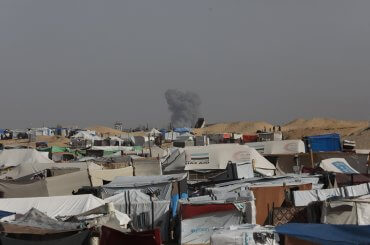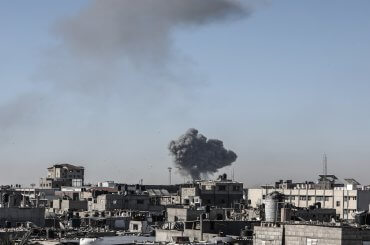A Jewish journalist recently asked me whether having a panel of Jews about the cultural boycott of Israel (see flyer below) privileges Jewish voices over those of Palestinians. This is a serious question deserving of serious consideration.
Of course we always have to be thinking about issues of power and privilege–whose voices are heard, how and where and when they are heard, and who hears them. Context is also important. To have a discussion beginning with a panel of Jews that is directed to the Jewish community is, in my view, one essential piece of the overall organizing that must take place. This internal work within the Jewish community requires holding each other—and those who claim to speak in our name—accountable. This means asking tough questions and challenging ourselves, like questioning our own complicity and silence, opening up a conversation that has been censored (and more), and understanding why it has been censored as well as the consequences of that censorship.
Further, this discussion is also about not allowing Jewish voices of peace to be illegitimized or silenced and refuting the false claim of the Israeli government and American Jewish establishment that all Jews support their policies and that they speak in the name of the Jewish people.
The conversation we will be having does not take the place of ones that center the voices and leadership of those most impacted by the grave injustice of the occupation–the Palestinian people. Rather, it is part of an overall, long-term campaign for building a movement. But we need to be mindful and intentional in our framing and how we act at all times—asking questions such as: Who is on the panel and why? How is the panel introduced and contextualized? Is this part of a larger strategy, or does it begin and end here?
Jews Say No!, a group I work with, is involved with a wide range of organizing. We support the Palestinian-led Boycott, Divestment, and Sanctions (BDS) struggle and stand with our allies in this work. We organize together with groups supporting justice in Palestine. For example, one of our large actions was a protest, together with a coalition of more than 20 organizations, that circled with our signs the Waldorf Astoria hotel, where the Friends of the Israel Defense Force was holding its annual fund-raising dinner. Several of our members were organizers of the U.S. Boat to Gaza.
We are also committed to engaging with the Jewish community. We present an alternative to the positions that the Israeli government and American Jewish establishment promote as the “only” valid Jewish perspective. We join thousands of Jews who say: “Not in our name.” For example, we published a Jewish statement, with signatories from across the globe, in support of the Goldstone Report, which was viciously attacked by the Israeli government and its supporters in the American Jewish community. We hold monthly street events in a heavily Jewish neighborhood where we talk to passersby and hold signs like “Am I a self-hating Jew if I oppose illegal and unethical policies of the Israeli government?”
We also hold conversations within the Jewish community to try to create more interaction with issues that we believe are critical to examine. For example, discussion about BDS has been censored by Jewish establishment spokespeople and organizations, where those who support BDS are most often viewed as “traitors” or “self-hating Jews.” The context in which this charge against BDS is taking place within the Jewish community is part of a broader effort to deny any acknowledgment of the destructive role of Israel and the U.S. in maintaining and supporting an illegal and unethical occupation and in denying the Palestinian people their fundamental rights. The Jewish establishment knows full well that silencing critics of Israel within its own community—and fostering the propaganda that all Jews support its policies–has consequences far beyond the Jewish community. These are some of the reasons why we organized two panels on Jewish perspectives on Boycott, Divestment, and Sanctions. The September 15th panel on cultural boycott of Israel is part of these conversations.
Those of us co-sponsoring the upcoming panel and discussion come from Jews Say No!, a synagogue, and a Brooklyn peace group. We have come together because we all believe a respectful and open conversation within the Jewish community about BDS is very much needed—and that it is our obligation to make this happen. While everyone is welcome and all are invited to participate in the discussion after the panel, the focus for this particular evening is on opening this discussion up within the Jewish community. That is why we are pleased it is being hosted by a Jewish institution, one in which the rabbi values a candid expression of different perspectives and the importance of listening and learning together.
The evening will be one of many different kinds of events that reflect multiple voices about, and experiences with BDS. I hope it will inspire us to think critically and challenge ourselves about the issues we are addressing and how we can most effectively take meaningful action and participate–within and outside our communities—in the larger Palestinian-led movement and ongoing struggle for justice.
Donna Nevel, a community psychologist and educator, is a long-time organizer for peace and justice in Palestine-Israel. This piece reflects her own perspective about why this panel is important.
_________________________________________________
An Open Conversation on Cultural Boycott of Israel
All are welcome!
Thursday, September 15, 2011; starting promptly at 7:30 p.m.
Kolot Chayeinu/Voices of Our Lives: Building a Progressive Jewish Community in Brooklyn, 1012 Eighth Avenue @ 10th Street in Park Slope
You are invited to a respectful and open discussion that begins with a panel of Jews who have many different perspectives about cultural boycott of Israel. During this time when the UN is scheduled to vote on Palestinian statehood, we hope to encourage discussion and thought within the Jewish community about how to best support movements for peace and justice in Palestine/Israel. This evening will provide an opportunity to hear from people with different points of view about whether cultural boycott is an appropriate and effective strategy for doing just that.
Background: Many artists and musicians and others oppose the Israeli occupation and support the cultural boycott of Israel–which is part of the international Boycott, Divestment, and Sanctions (BDS) campaign—as a non-violent way to press Israel to abide by international law and recognize Palestinians’ human rights and right to self-determination. This boycott includes the decision not to perform or exhibit in Israel or in settlements in the Occupied Territories. This also includes a call to boycott Israeli institutions that are complicit with the occupation. Supporters of BDS and of cultural boycott have joined an appeal called for by Palestinian civil society asking the international community to use this nonviolent tool at a time when the Israeli government, as well as the U.S. and European governments, have failed to act to stop the abuses that are intensifying and when other forms of pressure have not been successful.
Other artists, actors, and musicians and others, also committed to peace and justice, feel differently. They believe that a cultural boycott of Israel does more harm than good and is not an appropriate tool in the Israeli-Palestinian context. They accept—or support accepting—invitations to perform or exhibit in Israel and prefer to keep channels of communication open. When Israeli cultural institutions or artists perform in the US, some of these people prefer to focus on their art, and not to engage in political action such as protests or calls for boycott. Some who share this view about cultural boycott also feel this way about the Palestinian call regarding BDS in general or other specific expressions of it.
The event: On September 15, we are fortunate to hear speakers who have thought deeply about—and been involved in—issues of peace and justice, who have spent time in Israel/Palestine, and who disagree with each other about BDS and cultural boycott. Some of our speakers are active in the arts, and some are members of Jewish groups that focus on peace in the Middle East. Some are members of our host congregation. Our moderator will encourage the speakers and audience to probe deeply into these issues and the many questions that arise as we think and talk together and learn from and listen to each other. There will be time for audience members to ask questions and engage in discussion as well.
Speakers (organizational affiliation for identification purposes only): Udi Aloni*, Filmmaker; Dalit Baum*, Who Profits?; Jethro Eisenstein, Board of Directors, Jewish Voice for Peace; Roy Nathanson, Musician, member of Kolot Chayeinu/Voices of Our Lives; Lynne Sachs, Filmmaker, member of Kolot Chayeinu/Voices of Our Lives; Ron Skolnik, Executive Director, Partners for Progressive Israel (Meretz USA)
Moderator: Esther Kaplan, radio and print journalist; editor of The Investigative Fund at The Nation Institute; co-host of Beyond the Pale, which covers Jewish culture and politics on WBAI/New York
*The two Israeli speakers confirmed their participation prior to the July 11 passage in the Israeli Knesset of the “Bill for Prevention of Damage to the State of Israel Through Boycott.” This law, which has drawn widespread international criticism, limits freedom of expression and association and exposes Israeli citizens and organizations to litigation and penalties if they publicly call for all kinds of boycotts of Israel, settlements, or the occupation. Both speakers have once again confirmed they will join us.
____________________________________________________
Hosted by: Kolot Chayeinu/ Voices of Our Lives: Building a Progressive Jewish Community in Brooklyn
Organizing Committee: Naomi Allen (Brooklyn For Peace), Ricky Blum (Brooklyn For Peace), Mary Buchwald (Brooklyn For Peace), Elly Bulkin (Jews Say No!), Cindy Greenberg (Kolot Chayeinu / Voices of Our Lives), Carol Horwitz (Jews Say No!), Rabbi Ellen Lippmann (Kolot Chayeinu / Voices of Our Lives), Donna Nevel (Jews Say No!)

